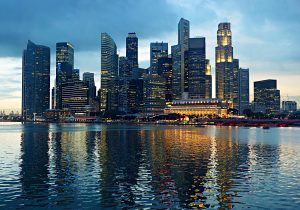Asian nations have experienced a broad and continued contraction of political space and civil liberties over the past year, according to the latest global survey by the CIVICUS Monitor, a global platform that tracks civic space and political freedoms.
The group’s annual report monitors respect for fundamental freedoms in 196 countries, grouping them into one of five categories: “open,” “narrowed,” “obstructed,” “repressed,” or “closed.” In total, the report claims, just 3.1 percent of the world’s population lives in countries rated as “open.”
The Asia-Pacific section of the report is characteristic of its findings. Of the 26 Asian countries and territories tracked by the CIVICUS Monitor, only Taiwan was rated “open.” Eleven were rated as “repressed,” seven as “obstructed,” four as “narrowed,” and four – China, Vietnam, Laos, and North Korea – as “closed.”
Like last year, the picture was slightly brighter in the Pacific, where seven of 12 countries are rated as open and four as narrowed, including Australia. Another rare point of light was Mongolia, which rose from the “obstructed” category to the “narrowed” one after the government passed new legislation defending human rights activism.
On the whole, however, this year’s report documented the continuation of the trend identified by the CIVICUS Monitor in 2020 – the global narrowing of democratic freedoms. Last year’s report noted much of the recent decline in fundamental freedoms had been justified by the COVID-19 pandemic, which had been used by repressive governments “as an opportunity to introduce or implement additional restrictions on civic freedoms.”
Across the Asia-Pacific, the new report shows, these restrictions have persisted or worsened as the pandemic has moved into its second year, a period in which many Asian countries have seen their worst outbreaks of the virus. “Over the past year the CIVICUS Monitor has continued to document restrictions and attacks on civic freedoms across the Asia Pacific region, at times under the pretext of dealing with the pandemic,” the report states.
In particular, pandemic restrictions on public gatherings have been used to quash the wave of protests that swept the region, including in Hong Kong, Myanmar, Thailand, Indonesia, Malaysia, and India. (Curiously, post-coup Myanmar somehow managed to avoid the “closed” category, despite its precipitous slide into violent military dictatorship.) Other frequently recorded violations include the use of restrictive laws to “criminalize and prosecute” human rights activists and the harassment of activists, journalists, and governments critics. Those arrested are often also subject to torture and ill-treatment while in detention.
Among the most notable Asia-Pacific developments in this year’s report is the downgrading of Singapore from “obstructed” to “repressed” owing to restrictions and laws that are used to “suppress activism and muzzle free speech.” While Singapore often escapes close international scrutiny due to its prosperity and the cool self-confidence of its technocratic elite, it has long been inhospitable terrain for dissenting thinkers. Even the Biden administration declined to invite Singapore to this week’s Democracy Summit, even though it arguably had every reason to wangle an invitation for one of its most important Asian partners.
According to the CIVICUS Monitor, the past year saw Prime Minister Lee Hsien Loong continue to burnish his reputation for suing journalists, a penchant that earned him a place on Reporters Without Borders’ list of “Press Freedom Predators” earlier this year. The blogger Leong Sze Hian, for instance, was forced to launch a crowdfunding appeal in May in a bid to raise the S$262,000 he had been ordered to pay the prime minister simply for sharing a Facebook post referring to alleged corruption. Terry Xu, the editor of The Online Citizen news site, was ordered to pay Lee a similar hefty amount after publishing content relating to government corruption. Under Singapore’s Penal Code, criminal defamation can result in a two-year jail sentence.
The report also flagged the much-criticized Foreign Interference (Countermeasures) Act (FICA), passed in October, aimed at detecting and disrupting hostile information campaigns by foreign entities. Civil libertarians and human rights groups have argued that the law that it hands arbitrary power to the Singaporean government to punish citizens on the basis of vague allegations of involvement with foreigners.
“Despite its claims to be a democracy, the Singaporean government has systematically chipped away at fundamental freedoms using ambiguous and overly broad legislation,” said Josef Benedict, Asia-Pacific Civic Space Researcher for CIVICUS, in a statement accompanying the report’s release. “The downgrade in its civic space ratings highlights this worrying deterioration.”

































